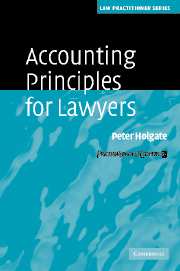Book contents
- Frontmatter
- Contents
- Acknowledgements
- Glossary of terms
- Part I The accounting environment
- 1 Introduction
- 2 UK GAAP and international harmonisation
- 3 The legal framework for accounting
- 4 Substance over form
- 5 The accounting profession and the regulatory framework for accounting and auditing
- 6 Communicating accounting information
- 7 Current trends in accounting
- Part II Some specifics
- Appendices
- Index
3 - The legal framework for accounting
from Part I - The accounting environment
Published online by Cambridge University Press: 28 July 2009
- Frontmatter
- Contents
- Acknowledgements
- Glossary of terms
- Part I The accounting environment
- 1 Introduction
- 2 UK GAAP and international harmonisation
- 3 The legal framework for accounting
- 4 Substance over form
- 5 The accounting profession and the regulatory framework for accounting and auditing
- 6 Communicating accounting information
- 7 Current trends in accounting
- Part II Some specifics
- Appendices
- Index
Summary
The Companies Act 1985
The CA 1985 deals with a wide range of matters, and other statutes impinge on companies in a variety of ways. Most of this is lawyers' territory and the purpose of this chapter, therefore, is restricted primarily to those aspects of the CA 1985 that relate to accounting.
Part VII of the CA 1985 deals with ‘Accounts and audit’ and further detail is found in various schedules to the CA 1985 of which the two that most concern us here are Schedule 4 ‘Form and content of company accounts’ and Schedule 4A ‘Form and content of group accounts’.
Much of the detail in those schedules emanates from the EU company law directives: Schedule 4 represents the UK implementation of the fourth directive of 1978 (Council Directive 78/660/EEC on the annual accounts of certain types of companies, OJ 1978 No. L222/11) and Schedule 4A represents the UK implementation of the seventh directive of 1983 (Council Directive 83/349/EEC on consolidated accounts, OJ 1983 No. L193/1). The implementation of these directives resulted not only in various changes but also in a much greater degree of legal prescription of accounting. The implementation of the directives also achieved a degree of harmonisation of the accounting aspects of company law across the EU. Examples of this can be seen in the formats, valuation rules and disclosures in Schedule 4.
- Type
- Chapter
- Information
- Accounting Principles for Lawyers , pp. 22 - 47Publisher: Cambridge University PressPrint publication year: 2006



